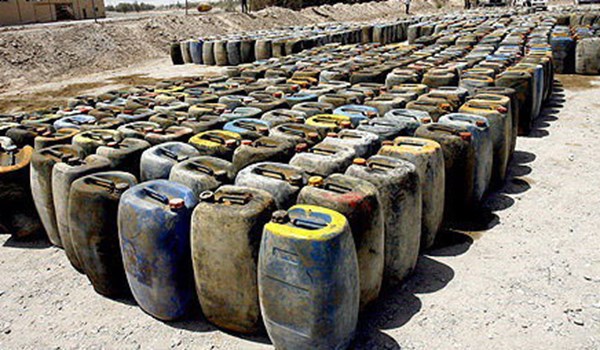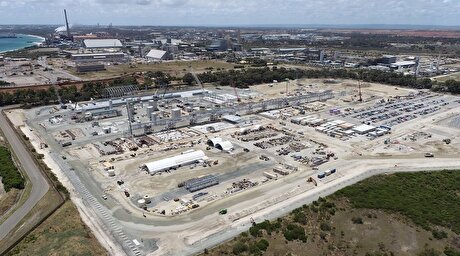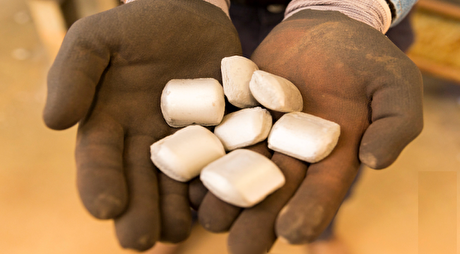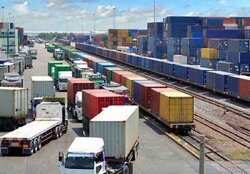
Intelligence Ministry Dismantles 3 Fuel Smuggling Gangs


The Intelligence Ministry made the announcement today that three gangs of smugglers who sneaked cheap fuel, subsidized by government for domestic use, into neighboring countries.
The Ministry announced that three organized fuel smuggling networks were disbanded in Marvdasht, Kazerun and Lamerd counties in the Southern province of Fars.
Accordingly, the cartels were involved in smuggling 17 million liters of fuel, such as petrol and diesel, selling their consignments to foreign elements on the other side of the border in Iraq, Pakistan and Afghanistan.
The statement added that five key members of the cartel were captured during the operation.
The decline in the value of Iranian national currency against foreign currencies has made the smuggling of fuel to neighboring countries a lucrative business.
In a related front, the Ministry announced on Sunday that it has disbanded a ring of economic saboteurs responsible for disrupting the country’s domestic market of petrochemical products.
Iranian intelligence forces have dismantled a major network of dealers who were disrupting the country’s domestic market of petrochemical products.
The security body announced that its forces have dismantled an organized network which was disrupting country’s economy and petrochemical market in Yazd province.
Three elements of this network have been arrested, the statement notes, adding that the ring was used to buy raw material of the petrochemical industry with subsidy price and sell them with higher prices in the market.
The proceeds from the network’s financial crimes are estimated to amount to 3 trillion Iranian rials, the ministry added.
It is also noted that further investigations are underway.
In a related front, the Ministry announced, earlier on January 20, that it had dismantled a 9-strong band of smugglers in the Northeastern province of East Azerbaijan.
It said that contrabandists were transferring silver cargo from China to Iraq and then to Tehran so as to distribute it across the country.
These cargos led to the shutdown of many silver-related workshops and businesses, added the statement.
Arrested smugglers had confessed that they have illegally imported some 23 tons of silver-made jewelry during the past five years.
The report did not mention the amount of silver seized during the operation.
In a related front, the Ministry announced on January 07 that the security body had arrested 25 members of two criminal networks that had infiltrated into the banking and foreign currency system of the country.
The Ministry reported that it disbanded two criminal networks on charges of economic corruption, arresting 25 key members of these two rings.
The corruption rings had received foreign currency by bribery, using commercial cards (government licenses for import/export) of front companies, forging pre-invoices for registering an order for the import of necessity goods, and blindsided banks from following up on where the foreign currency credits had been put to use.
Arrests were been made in provinces of Qazvin, Tehran, Mazandaran, and East Azerbaijan, the report maintains, adding that criminals have been handed over to judiciary officials.
On December 31, the Ministry announced that 11 members of a gang charged with defrauding government's foreign currency reserves of around $1.2 billion on the pretext of importing basic commodities had been arrested in the Western Iranian province of Kurdistan.
According to the statement, the network had taken 47 trillion rials (roughly $1.2 billion) of the government's foreign currency reserves under the false pretext of importing necessity goods, but instead invested the amount in some other countries.
The ring had received foreign currency by bribery, using commercial cards (government licenses for import/export) of front companies, forging pre-invoices for registering an order for the import of necessity goods, and blindsided banks from following up on where the foreign currency credits had been put to use.
On Dec. 25, an extended 17-strong fraud gang who formed a criminal network across 6 provinces in Iran was also dismantled by the intelligence ministry.
In a coordinated operation, Intelligence Ministry forces arrested 17 members of a sophisticated fraud gang that had infiltrated into the banking and foreign currency system of the country, busting a criminal network which sprawled over the provinces of Sistan and Baluchestan, Tehran, Mazandaran, Qom, Kerman and Isfahan.
Following the operation, the Intelligence Ministry issued a statement, explaining that the network was involved with registering orders for importing goods with bogus documents, and used government's foreign currency reserves with no intention of imports and for their own personal uses.
Thanks to the measures taken by Sistan and Baluchestan Intelligence Department General and special cooperation from the province's judicial bodies, the statement adds, 87 front companies were identified, and a great number of fabricated documents and seals related to both domestic and foreign companies were discovered. The operation prevented the capital flight of €300 million worth of government's foreign currency reserves.
Iran has undertaken a series of massive moves to counter individuals, gangs, and groups that disrupt the national economy in pursuit of personal over-night gains.
Late in autumn, two giant economic saboteurs were executed for creating turmoil in the natural flow of the national economy in the past years.
Hamidreza Baqeri Dermani, nicknamed "the Sultan of Bitumen," was hanged on Saturday after conviction on the charge of “corruption on earth,” which carries capital punishment.
He was a corrupt businessman who had appropriated more than 10 trillion rials ($100 million) mainly by defrauding banks and a major oil refining firm.
He had also headed a gang who exploited a surge in gold demand.
Earlier on November, Vahid Mazloumin, nicknamed as the "Sultan of Coins", and his accomplice were executed after they were convicted for contributing to chaos in Iran's gold coin and foreign currency markets.


Caterpillar sees US tariff hit of up to $1.5 billion this year

Australia pledges $87M to rescue Trafigura’s Nyrstar smelters in critical minerals push

SAIL Bhilai Steel relies on Danieli proprietary technology to expand plate mill portfolio to higher steel grades

Alba Discloses its Financial Results for the Second Quarter and H1 of 2025

Fortuna rises on improved resource estimate for Senegal gold project

Tianqi Lithium Australia JV says it is prioritizing long-term viability of refinery

Copper price slips as unwinding of tariff trade boosts LME stockpiles

US slaps tariffs on 1-kg, 100-oz gold bars: Financial Times

Fresnillo lifts gold forecast on strong first-half surge

De Beers strikes first kimberlite field in 30 years

Minera Alamos buys Equinox’s Nevada assets for $115M

OceanaGold hits new high on strong Q2 results

What’s next for the USGS critical mineral list

South Africa looks to join international diamond marketing push

Copper price gains on Chinese demand, Chilean supply risks

Gold exploration spend trending down despite higher prices – S&P Global

A global market based on gold bars shudders on tariff threat

New research reveals source of world’s richest lithium deposits

Century Aluminum to invest $50M in Mt. Holly smelter restart in South Carolina

De Beers strikes first kimberlite field in 30 years

Minera Alamos buys Equinox’s Nevada assets for $115M

OceanaGold hits new high on strong Q2 results

South Africa looks to join international diamond marketing push

Copper price gains on Chinese demand, Chilean supply risks

Gold exploration spend trending down despite higher prices – S&P Global

A global market based on gold bars shudders on tariff threat

Century Aluminum to invest $50M in Mt. Holly smelter restart in South Carolina

Australia to invest $33 million to boost Liontown’s Kathleen lithium operations















